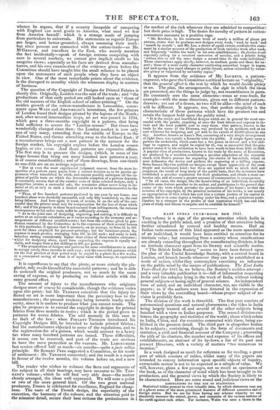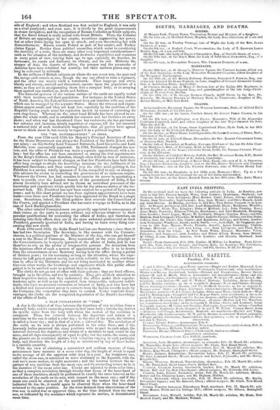EAST INDIA YEAR-BOOK POE 1841.
Tins volume is a sign of the growing attention which India is exciting in the public mind, and a promise of that attention being further stimulated by natural and healthy means. Had an Indian vade-mecum of this kind appeared as the mere speculation of an individual, it would have been entitled to attention for its intrinsic value ; but emanating from a society whose ramifications are already extending throughout the manufacturing districts, it has an intrinsic character apart from its literary and scientific merits.
" The British India Society" seems to have been formed upon the plan of the Useful Knowledge Society, with a central board in London, and branch boards wherever they can be established as a mode of action, whilst they contemplate exercising an influence on the public mind by the means of publications. The East India Year-Book for 1841 is, we believe, the Society's maiden attempt : and a very valuable publication it is—full of information respecting India and the colonies lying in the track of India, without sinking general subjects or losing sight of general science. An independent tone of mind, and an individual character, too, are visible in the papers ; as if the authors were less fettered in the expression of their views by the controlling board—whose proper subject of re- vision is probably facts.
The division of the work is threefold. The first part consists of astronomical questions and natural phienomena ; the tides in India being largely treated of, and several of the other subjects being handled with a view to Indian purposes. The second division em- braces the geography and statistics of the world ; those which relate to India, China, and the countries connected with them, being ex- hibited in the greatest detail. The third part is altogether Indian in its subjects ; containing, though in the form of documents and statistics, a civil and financial account of the Company ; presenting the pith of its charters, the number and expense of its offices and establishments, an abstract of its by-laws, a list of its past and present Directors, with a variety of matters "too numerous to mention."
In'a work designed as much for reference as for reading, a great part of which consists of tables, whilst many of the papers are intended to convey information upon specific objects of inquiry, extractable matter is not to be expected as a staple of value. We will, however, glean a few passages, not so much as specimens of the book, as of the character of mind which has been brought to its production, and the general views by which the Society is likely to be characterized. Here are some sound and judicious views on the
LIMITATIONS TO THE USE OF STATISTICS.
Statistical tables present to view valuable data, by which statesmen may sea at a glance some of the more prominent features of different countries and of foreign states. But we are far from having any scheme whereby we can absolutely measure the extent, power, and resources of the various nations of the earth against each other. For instance, Wales was once a thorn in the
side of England ; and when Scotland was drat united to England, it was only as a rival paralyzed; and even now, it is chiefly by the great improvements in steam navigation, and the recognition of Roman Catholics as fellow-subjects, that the Sister Island is really united with Great Britain. Then, the Colonies of Britain are appendages to her empire, sometimes augmenting her power, but at other times laying her open to attack, and even threatening her with dismemberment. Russia counts Poland as part of her empire, and Turkey claims Egypt. Besides these political anomalies, which occur in considering the territory of a state, there are many other very important considerations— such as the situation of the territory, and its diverse capabilities and resources in every point of view, varying from age to age, especially its frontier, its fastnesses, its coasts and harbours, its climate, and its soil. Hitherto the steppes of Asia, the deserts of Africa, the pampas and the savannahs of America have been inhabited but scantily, but their uniform plains may ere long be enlivened by railroads. In the millions of British subjects on whom the sun never sets, the peer and the savage each counts as one, though the one can afford to raise a regiment, and the other can merely wield a tomahawk. Then language and creed, liberty and slavery, content and discontent, operate upon the population of a state, as they act in amalgamating them into a compact body, or in arraying them against one another, as Arabs and Indians.
The financial systems of the various nations of the earth are equally varied with their territory and their population. For instance, in the United States of North America, the Federal Government does not interfere with any matter which can be managed by the separate States. Hence the revenue and exn- diture appear small, and they are kept low, especially by the ambition of the Republic having ample scope for expansion merely by means of extending its own ring-fence. Whereas, on the other hand Britain has been pleased to ex- plore the whole world, and to establish her colonies and her factories on every shore ; and when war has threatened these her customers, she has garrisoned her colonies and factories, utterly regardless of expense, till she has incurred a national debt of such incalculable magnitude, that all parties have agreed never to think about it, but merely to regard it as a political bugbear.
THE "MR. MOTHEREOUNTRY " OF INDIA.
From the year 1784 until 1793, his Majesty's Principal Secretary of State for the Home Department was always the President of the India Board, with- out salary : on this footing Lord Viscount Sidmouth, Lord Grenville, and Lord Melville, were successively appointed. In 1793, Parliament changed the sys- tem, and the office of President was made a separate appointment, with a sa- lary : but the office has not been considered as among the first appointments in the King's Cabinet, and therefore, though often filled by men of eminence, it has been subject to frequent changes, so that few Presidents have held their office long enough to attain the knowledge necessary fur the fulfilment of its important functions ; and from entering into the office until quitting it, the President is a novice, totally ignorant of India, compelled to rely on irrespon- sible advisers for advice in controlling the government of an immense empire. Whenever the Crown has had occasion to exercise its power in appointing a man to preside over the London branch of the government of India, it has almost invariably been advised not to choose an individual possessed of the knowledge and experience which qualify him for the arduous duties of the im- portant task. The President has now been salaried for a period of forty-seven years; and in this short period no less than eighteen appointments have been made—even three new Presidents have been appointed to the Board in a single year. Sometimes, indeed, the blind goddess does overrule the Councillors of the Crown, and appoint a President who has made a voyage to India, as in Ale ease of Lord Buckinghamshire.
The other salaried Commissioners are generally appointed in consequence of their claims on the party in power, without any reference whatever to their peculiar qualifications for controlling the affairs of India; and therefore, on entering into their offices, they are in the earns awkward predicament as their President, generally ignorant of India, and having to learn every thing con- cerning this new world. From 1784 until 1832, the India Board had but one Secretary ; since then it
has bad two Secretaries. The Secretary, in like manner with the Commis- sioners, is a political partisan of the Minister of the day, who can get himself a seat in the House of Commons. Beng nominated on the same principle as the Commissioners, he is equally ignorant of the affairs of India, and he has therefore to rely on the advice of irresponsible persons. No deduction from the injurious effect of such a system of appointment to office is to be drawn from the circumstance of one Secretary having held the office during a period of thirteen years ; for his remaining so long in the situation, where the expe- rience he had gained proved useful, was solely referable to the long continua- tion in office of the Ministers, and his not being nominated to another situa- tion—in other words, the knowledge and experience which this public officer gained is to be ascribed more to accident than to system.
The clerks do not go out of office with their patrons ; they are fixed officers,
brought up in the office, and rise by seniority. They give all their attention to their respective duties, and they understand the affairs under their superin- tendence quite as well as can be expected from irreponsible, unknown indivi- duals, who have no personal connexion or interest in India, and who have but a limited and inconvenient access to extracts from the Indian records made by the Company, the corporation they have to controL Under manifold disad- vantages, the clerks are the recognized depositories of the Board's knowledge of the affairs of India.
A NEAT EXPLANATION OF " TIME."
A day is the interval of time between the departure of any meridian from a heavenly body, and its succeeding return to that same body ; and the day derives its specific name from the body with which the motion of the meridian is compared. Thus, the interval between the departure and return of a meridian to the sun is called a solar day ; in the case of the moon, the interval is called a lunar day ; and in that of a star, a sidereal day. The revolution of the earth on its axis is always performed in the same time ; and if the heavenly bodies preserved the same positions with re: ect to each other, the intervals between the departure and return of a meridian to each would be the same, and all days consequently of equal length ; but the earth, the moon, and the planets are in continual motion, with velocities varying in each particular body, and therefore the length of a day as determined by any of these bodies is a variable quantity. With the view of obtaining a convenient and uniform measure of time, astronomers have recourse to a mean solar day, the length of which is equal to the average of all the apparent solar days in a year. An imaginary sun, called the mean sun, is conceived to move uniformly in the Equator, with the real sun's mean motion, in right ascension ; and the interval between the de- parture of any meridian from the mean sun, and its succeeding return to it, is the duration of the mean solar day. Clocks are adjusted to mean solar time ; so that a complete revolution through twenty-four hours of the hour-hand of one of these machines, should be performed in exactly the same interval as the revolution of the earth on its axis, with respect to the mean sun ; and if the mean sun could be observed on the meridian at the instant that the clock indicated Oh. Om. Os., it would again be observed there when the hour-hand returned to the same position. As the time deduced from observations of the true sun is called true or apparent time, so the time deduced from the mean sun, or indicated by the machines which represent its motion, is denominated mean time.



























 Previous page
Previous page